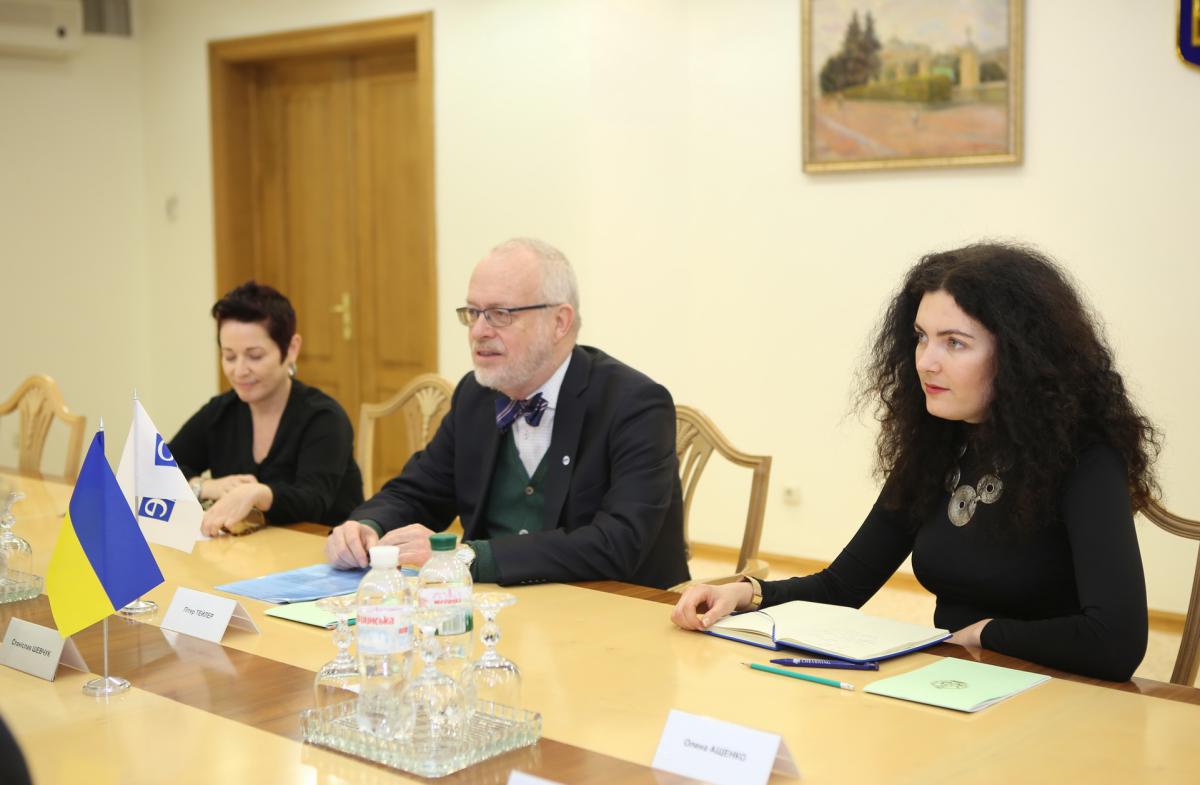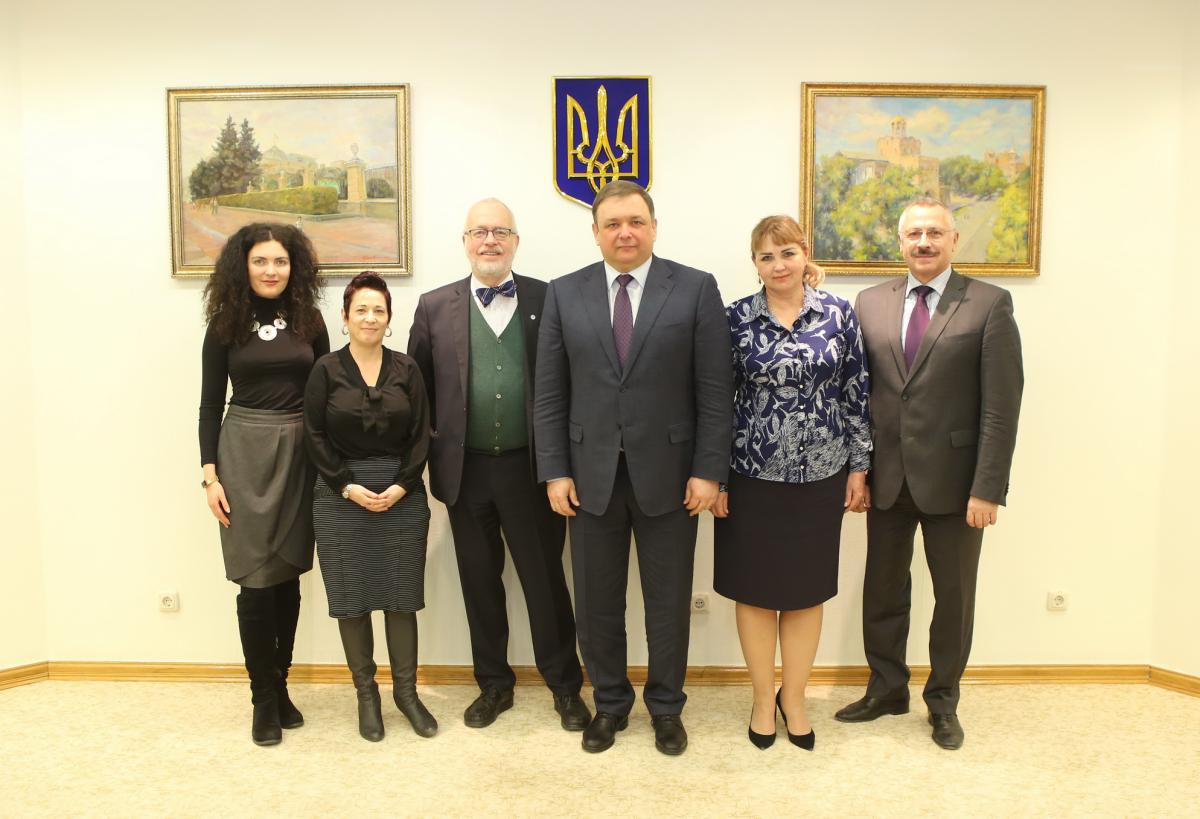“After the constitutional reform, the Constitutional Court of Ukraine has become stronger and ready
for today’s difficulties and challenges” – Peter Tejler
25.02.2019
On February 25, the Chairman of the Constitutional Court of Ukraine Stanislav Shevchuk held a meeting with the Head of Election Observation Mission, OSCE Office for Democratic Institutions and Human Rights (ODIHR) Peter Tejler in the Constitutional Court of Ukraine.
The meeting was attended by judge of the Constitutional Court of Ukraine Serhiy Holovaty, judge of the Constitutional Court of Ukraine, Chairman of the Court’s Standing commission on international relations Natalia Shaptala, Legal Analyst of Election Observation Mission, OSCE Office for Democratic Institutions and Human Rights (ODIHR) Marla Morry and Senior Assistant Legal Analyst of Election Observation Mission, OSCE Office for Democratic Institutions and Human Rights (ODIHR) Olena Ashchenko.
 Peter Tejler mentioned that the Election Observation Mission, OSCE Office for Democratic Institutions and Human Rights (ODIHR), on the Ministry of Foreign Affairs of Ukraine initiative, began to monitor the election of the President of Ukraine in 2019. “It is important that Ukraine has an honest, democratic presidential election,” he added.
Peter Tejler mentioned that the Election Observation Mission, OSCE Office for Democratic Institutions and Human Rights (ODIHR), on the Ministry of Foreign Affairs of Ukraine initiative, began to monitor the election of the President of Ukraine in 2019. “It is important that Ukraine has an honest, democratic presidential election,” he added.
The Head of the Mission noted that since the last Mission, many important reforms took place in Ukraine. Therefore, the guests were interested in, in particular, the issue of the effectiveness of the constitutional reform of 2016, the mechanism for amending the Constitution of the state.
Peter Tejler expressed his conviction that аfter the constitutional reform, the Constitutional Court of Ukraine has become stronger and ready for today’s difficulties and challenges.
 The Chairman of the Constitutional Court of Ukraine Stanislav Shevchuk noted that in 2016, amendments to the Constitution of Ukraine in the area of justice were introduced. “The greatest achievement of the constitutional reform is the introduction of constitutional complaint institute, which enabled a person to directly appeal to the Constitutional Court of Ukraine in order to protect his/her constitutional rights,” the Chairman of the Court emphasised.
The Chairman of the Constitutional Court of Ukraine Stanislav Shevchuk noted that in 2016, amendments to the Constitution of Ukraine in the area of justice were introduced. “The greatest achievement of the constitutional reform is the introduction of constitutional complaint institute, which enabled a person to directly appeal to the Constitutional Court of Ukraine in order to protect his/her constitutional rights,” the Chairman of the Court emphasised.
According to Stanislav Shevchuk, the constitutional complaint should contain, in particular, the substantiation of the allegations concerning the unconstitutionality of a specific law (its separate provisions), indicating that the person's rights guaranteed by the Constitution of Ukraine were violated as a result of the application of this law, and also that the person must exhaust all national legal means protection to obtain a final judicial decision.
The Chairman informed the guests that since the introduction of the constitutional complaint institute, that is from 2016, 1,291 complaints have been received by the Constitutional Court of Ukraine. At present, 43 rulings were adopted on initiating constitutional proceedings upon constitutional complaints. “Most often, the Constitutional Court addresses citizens with constitutional complaints on social issues and protection of the right to appeal,” he added.
 In the context of the constitutional reform, Stanislav Shevchuk highlighted the guarantees of judicial independence. “The changes that have taken place considerably strengthened the independence of the constitutional jurisdiction body. An important element of constitutional reform is the selection of Constitutional Court’s judges on a competitive basis. This is important, as the public knows what the composition of the competition commission is and who the candidates are”, the Chairman emphasised.
In the context of the constitutional reform, Stanislav Shevchuk highlighted the guarantees of judicial independence. “The changes that have taken place considerably strengthened the independence of the constitutional jurisdiction body. An important element of constitutional reform is the selection of Constitutional Court’s judges on a competitive basis. This is important, as the public knows what the composition of the competition commission is and who the candidates are”, the Chairman emphasised.
In addition, Stanislav Shevchuk noted, that according to the previous wording of the Law of Ukraine “On the Constitutional Court of Ukraine”, the subject of the appointment had the right to dismiss the Constitutional Court judges for breach of oath. Changes to the Constitution of Ukraine in 2016 and the Law of Ukraine “On the Constitutional Court of Ukraine” stipulate that only the Court itself may dismiss judges.
The judge of the Constitutional Court of Ukraine Serhiy Holovaty emphasised that the Constitutional Court of Ukraine is a separate body and does not belong to any branch of state power. The Constitutional Court of Ukraine remains outside of politics and electoral processes. “We do not feel the influence of the electoral process”, he added.
The parties also discussed other topical issues of constitutional justice and thanked each other for interesting meeting and expressed hope for further fruitful cooperation.



